Fleurs du Mal Magazine


Or see the index
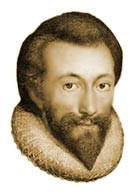
Air and Angels
Twice or thrice had I lov’d thee,
Before I knew thy face or name;
So in a voice, so in a shapeless flame
Angels affect us oft, and worshipp’d be;
Still when, to where thou wert, I came,
Some lovely glorious nothing I did see.
But since my soul, whose child love is,
Takes limbs of flesh, and else could nothing do,
More subtle than the parent is
Love must not be, but take a body too;
And therefore what thou wert, and who,
I bid Love ask, and now
That it assume thy body, I allow,
And fix itself in thy lip, eye, and brow.
Whilst thus to ballast love I thought,
And so more steadily to have gone,
With wares which would sink admiration,
I saw I had love’s pinnace overfraught;
Ev’ry thy hair for love to work upon
Is much too much, some fitter must be sought;
For, nor in nothing, nor in things
Extreme, and scatt’ring bright, can love inhere;
Then, as an angel, face, and wings
Of air, not pure as it, yet pure, doth wear,
So thy love may be my love’s sphere;
Just such disparity
As is ‘twixt air and angels’ purity,
‘Twixt women’s love, and men’s, will ever be.
John Donne
(1572–1631)
Air and Angels
• fleursdumal.nl magazine
More in: Archive C-D, Archive C-D, Donne, John
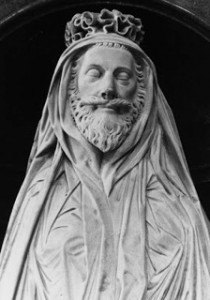
The Rising Sun
Busy old fool, unruly Sun,
Why dost thou thus,
Through windows, and through curtains, call on us ?
Must to thy motions lovers’ seasons run ?
Saucy pedantic wretch, go chide
Late school-boys and sour prentices,
Go tell court-huntsmen that the king will ride,
Call country ants to harvest offices ;
Love, all alike, no season knows nor clime,
Nor hours, days, months, which are the rags of time.
Thy beams so reverend, and strong
Why shouldst thou think ?
I could eclipse and cloud them with a wink,
But that I would not lose her sight so long.
If her eyes have not blinded thine,
Look, and to-morrow late tell me,
Whether both th’ Indias of spice and mine
Be where thou left’st them, or lie here with me.
Ask for those kings whom thou saw’st yesterday,
And thou shalt hear, “All here in one bed lay.”
She’s all states, and all princes I ;
Nothing else is ;
Princes do but play us ; compared to this,
All honour’s mimic, all wealth alchemy.
Thou, Sun, art half as happy as we,
In that the world’s contracted thus ;
Thine age asks ease, and since thy duties be
To warm the world, that’s done in warming us.
Shine here to us, and thou art everywhere ;
This bed thy center is, these walls thy sphere.
John Donne
(1572–1631)
The Rising Sun
• fleursdumal.nl magazine
More in: Archive C-D, Archive C-D, Donne, John
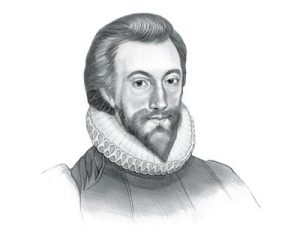
The Ecstasy
Where, like a pillow on a bed
A pregnant bank swell’d up to rest
The violet’s reclining head,
Sat we two, one another’s best.
Our hands were firmly cemented
With a fast balm, which thence did spring;
Our eye-beams twisted, and did thread
Our eyes upon one double string;
So to’intergraft our hands, as yet
Was all the means to make us one,
And pictures in our eyes to get
Was all our propagation.
As ‘twixt two equal armies fate
Suspends uncertain victory,
Our souls (which to advance their state
Were gone out) hung ‘twixt her and me.
And whilst our souls negotiate there,
We like sepulchral statues lay;
All day, the same our postures were,
And we said nothing, all the day.
If any, so by love refin’d
That he soul’s language understood,
And by good love were grown all mind,
Within convenient distance stood,
He (though he knew not which soul spake,
Because both meant, both spake the same)
Might thence a new concoction take
And part far purer than he came.
This ecstasy doth unperplex,
We said, and tell us what we love;
We see by this it was not sex,
We see we saw not what did move;
But as all several souls contain
Mixture of things, they know not what,
Love these mix’d souls doth mix again
And makes both one, each this and that.
A single violet transplant,
The strength, the colour, and the size,
(All which before was poor and scant)
Redoubles still, and multiplies.
When love with one another so
Interinanimates two souls,
That abler soul, which thence doth flow,
Defects of loneliness controls.
We then, who are this new soul, know
Of what we are compos’d and made,
For th’ atomies of which we grow
Are souls, whom no change can invade.
But oh alas, so long, so far,
Our bodies why do we forbear?
They’are ours, though they’are not we; we are
The intelligences, they the spheres.
We owe them thanks, because they thus
Did us, to us, at first convey,
Yielded their senses’ force to us,
Nor are dross to us, but allay.
On man heaven’s influence works not so,
But that it first imprints the air;
So soul into the soul may flow,
Though it to body first repair.
As our blood labors to beget
Spirits, as like souls as it can,
Because such fingers need to knit
That subtle knot which makes us man,
So must pure lovers’ souls descend
T’ affections, and to faculties,
Which sense may reach and apprehend,
Else a great prince in prison lies.
To’our bodies turn we then, that so
Weak men on love reveal’d may look;
Love’s mysteries in souls do grow,
But yet the body is his book.
And if some lover, such as we,
Have heard this dialogue of one,
Let him still mark us, he shall see
Small change, when we’are to bodies gone.
John Donne
(1572–1631)
The Ecstasy
• fleursdumal.nl magazine
More in: Archive C-D, Archive C-D, Donne, John
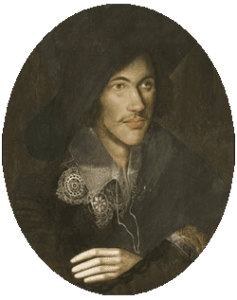
Song:
Sweetest love, I do not go
Sweetest love, I do not go,
For weariness of thee,
Nor in hope the world can show
A fitter love for me;
But since that I
Must die at last, ’tis best
To use myself in jest
Thus by feign’d deaths to die.
Yesternight the sun went hence,
And yet is here today;
He hath no desire nor sense,
Nor half so short a way:
Then fear not me,
But believe that I shall make
Speedier journeys, since I take
More wings and spurs than he.
O how feeble is man’s power,
That if good fortune fall,
Cannot add another hour,
Nor a lost hour recall!
But come bad chance,
And we join to’it our strength,
And we teach it art and length,
Itself o’er us to’advance.
When thou sigh’st, thou sigh’st not wind,
But sigh’st my soul away;
When thou weep’st, unkindly kind,
My life’s blood doth decay.
It cannot be
That thou lov’st me, as thou say’st,
If in thine my life thou waste,
That art the best of me.
Let not thy divining heart
Forethink me any ill;
Destiny may take thy part,
And may thy fears fulfil;
But think that we
Are but turn’d aside to sleep;
They who one another keep
Alive, ne’er parted be.
John Donne
(1572–1631)
Song: Sweetest love, I do not go
• fleursdumal.nl magazine
More in: Archive C-D, Archive C-D, Donne, John

Woman’s Constancy
Now thou has loved me one whole day,
Tomorrow when you leav’st, what wilt thou say?
Wilt thou then antedate some new-made vow?
Or say that now
We are not just those persons which we were?
Or, that oaths made in reverential fear
Of Love, and his wrath, any may forswear?
Or, as true deaths true marriages untie,
So lovers’ contracts, images of those,
Bind but till sleep, death’s image, them unloose?
Or, your own end to justify,
For having purposed change and falsehood, you
Can have no way but falsehood to be true?
Vain lunatic, against these ‘scapes I could
Dispute and conquer, if I would,
Which I abstain to do,
For by tomorrow, I may think so too.
John Donne
(1572–1631)
Woman’s Constancy
• fleursdumal.nl magazine
More in: Archive C-D, Archive C-D, Donne, John

No Man Is an Island
No man is an island,
Entire of itself;
Every man is a piece of the continent,
A part of the main.
If a clod be washed away by the sea,
Europe is the less,
As well as if a promontory were:
As well as if a manor of thy friend’s
Or of thine own were.
Any man’s death diminishes me,
Because I am involved in mankind.
And therefore never send to know for whom the bell tolls;
It tolls for thee.
John Donne
(1572–1631)
No Man Is an Island
• fleursdumal.nl magazine
More in: Archive C-D, Archive C-D, Donne, John

A Burnt Ship
Out of a fired ship, which by no way
But drowning could be rescued from the flame,
Some men leap’d forth, and ever as they came
Near the foes’ ships, did by their shot decay;
So all were lost, which in the ship were found,
They in the sea being burnt, they in the burnt ship drown’d.
John Donne
(1572–1631)
A Burnt Ship
• fleursdumal.nl magazine
More in: Archive C-D, Archive C-D, Donne, John
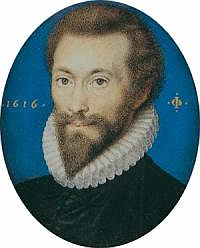
Death be Not Proud
Death be not proud, though some have called thee
Mighty and dreadfull, for, thou art not soe,
For, those, whom thou think’st, thou dost overthrow,
Die not, poore death, nor yet canst thou kill mee.
From rest and sleepe, which but thy pictures bee,
Much pleasure, then from thee, much more must flow,
And soonest our best men with thee doe goe,
Rest of their bones, and soules deliverie.
Thou art slave to Fate, Chance, kings, and desperate men,
And dost with poyson, warre, and sicknesse dwell,
And poppie, or charmes can make us sleepe as well,
And better then thy stroake; why swell’st thou then?
One short sleepe past, wee wake eternally,
And death shall be no more; death, thou shalt die.
John Donne
(1572 – 1631)
Death be Not Proud
(±1618)
• fleursdumal.nl magazine
More in: Archive C-D, Archive C-D, Donne, John

Sweetest Love, I do Not Go
Sweetest love, I do not go,
For weariness of thee,
Nor in hope the world can show
A fitter love for me;
But since that I
At the last must part, ’tis best,
Thus to use myself in jest
By feigned deaths to die.
Yesternight the sun went hence,
And yet is here to-day;
He hath no desire nor sense,
Nor half so short a way;
Then fear not me,
But believe that I shall make
Speedier journeys, since I take
More wings and spurs than he.
O how feeble is man’s power,
That if good fortune fall,
Cannot add another hour,
Nor a lost hour recall;
But come bad chance,
And we join to it our strength,
And we teach it art and length,
Itself o’er us to advance.
When thou sigh’st, thou sigh’st not wind,
But sigh’st my soul away;
When thou weep’st, unkindly kind,
My life’s blood doth decay.
It cannot be
That thou lovest me as thou say’st,
If in thine my life thou waste,
That art the best of me.
Let not thy divining heart
Forethink me any ill;
Destiny may take thy part,
And may thy fears fulfil.
But think that we
Are but turn’d aside to sleep.
They who one another keep
Alive, ne’er parted be.
John Donne
(1572 – 1631)
Sweetest Love, I do Not Go
• fleursdumal.nl magazine
More in: Archive C-D, Archive C-D, Donne, John

The Broken Heart
He is stark mad, whoever says,
That he hath been in love an hour,
Yet not that love so soon decays,
But that it can ten in less space devour;
Who will believe me, if I swear
That I have had the plague a year?
Who would not laugh at me, if I should say
I saw a flash of powder burn a day?
Ah, what a trifle is a heart,
If once into love’s hands it come!
All other griefs allow a part
To other griefs, and ask themselves but some;
They come to us, but us love draws;
He swallows us and never chaws;
By him, as by chain’d shot, whole ranks do die;
He is the tyrant pike, our hearts the fry.
If ’twere not so, what did become
Of my heart when I first saw thee?
I brought a heart into the room,
But from the room I carried none with me.
If it had gone to thee, I know
Mine would have taught thine heart to show
More pity unto me ; but Love, alas!
At one first blow did shiver it as glass.
Yet nothing can to nothing fall,
Nor any place be empty quite;
Therefore I think my breast hath all
Those pieces still, though they be not unite;
And now, as broken glasses show
A hundred lesser faces, so
My rags of heart can like, wish, and adore,
But after one such love, can love no more.
John Donne
(1572 – 1631)
The Broken Heart
• fleursdumal.nl magazine
More in: Archive C-D, Archive C-D, Donne, John
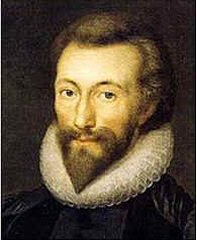
John Donne
The Flea
Mark but this flea, and mark in this,
How little that which thou deny’st me is;
It sucked me first, and now sucks thee,
And in this flea our two bloods mingled be;
Thou know’st that this cannot be said
A sin, nor shame, nor loss of maidenhead;
Yet this enjoys before it woo,
And pampered swells with one blood made of two,
And this, alas, is more than we would do.
Oh stay, three lives in one flea spare,
Where we almost, yea, more than married are.
This flea is you and I, and this
Our marriage bed, and marriage temple is;
Though parents grudge, and you, w’are met,
And cloistered in these living walls of jet.
Though use make you apt to kill me,
Let not to that, self-murder added be,
And sacrilege, three sins in killing three.
Cruel and sudden, hast thou since
Purpled thy nail in blood of innocence?
Wherein could this flea guilty be,
Except in that drop which it sucked from thee?
Yet thou triumph’st and say’st that thou
Find’st not thyself, nor me the weaker now;
‘Tis true, then learn how false fears be:
Just so much honor, when thou yield’st to me,
Will waste, as this flea’s death took life from thee
John Donne (1572 – 1631)
Poem: The Flea
fleursdumal.nl magazine
More in: Archive C-D, Donne, John
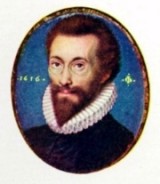
John Donne
(1572-1631)
Song: Go and catch a falling star
Goe, and catche a falling starre,
Get with child a mandrake roote,
Tell me, where all past yeares are,
Or who cleft the Divels foot,
Teach me to heare Mermaides singing,
Or to keep off envies stinging,
And find
What winde
Serves to advance an honest minde.
If thou beest borne to strange sights,
Things invisible to see,
Ride ten thousand daies and nights,
Till age snow white haires on thee,
Thou, when thou retorn’st, wilt tell me
All strange wonders that befell thee,
And sweare
No where
Loves a woman true, and faire.
If thou findst one, let mee know,
Such a Pilgrimage were sweet;
Yet doe not, I would not goe,
Though at next doore wee might meet,
Though shee were true, when you met her,
And last, till you write your letter,
Yet shee
Will bee
False, ere I come, to two, or three.
John Donne poetry
fleursdumal.nl magazine
More in: Archive C-D, Donne, John
Thank you for reading Fleurs du Mal - magazine for art & literature